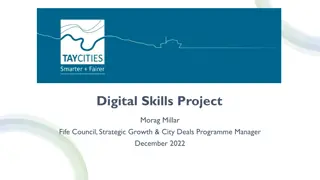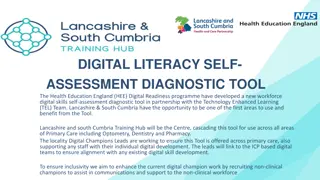Understanding the Importance of Digital Skills in Today's Economy
Digital skills play a crucial role in driving economic growth, with the UK digital tech sector experiencing significant advancements. However, there are challenges such as skills shortages and the need for updated qualifications to meet evolving industry demands. Action is required to address these trends and ensure the workforce is equipped to thrive in the digital age.
Download Presentation

Please find below an Image/Link to download the presentation.
The content on the website is provided AS IS for your information and personal use only. It may not be sold, licensed, or shared on other websites without obtaining consent from the author. Download presentation by click this link. If you encounter any issues during the download, it is possible that the publisher has removed the file from their server.
E N D
Presentation Transcript
Digital Skills: The current policy landscape The Institute for Coding competition Nicola Turner, MBE Head of Skills CPHC conference, Microsoft, Reading 24 April 2017
What I will cover Why are digital skills important? What are the key challenges highlights from reports What is the government s strategy? The Institute of Coding competition
Why are digital skills important? Digital Growth -The turnover of the UK digital tech industries was estimated at 170 billion in 2015. This is a growth rate of 22% (or 30 billion) in five years. Regional clusters drew in 68% of total investment in UK digital tech strengths in Edinburgh, Cambridge, Bristol & Bath, Oxford, Manchester, Sheffield GVA of tech worker is 2X higher than non-tech ( 103k: 50k) There are now 1.64 million digital tech jobs in the UK, and the digital sector is creating jobs 2X as fast than the non-digital sector. UK needs 1.2 million more skilled tech workers by 2022 Sources: Tech City Report 2016 and Digital skills for the UK Economy January 2016
Action is needed to address current trends UK productivity lags behind other developed economies Number of employees who worked fewer hours than usual because they attended a training course away from their workplace 200,000 180,000 160,000 140,000 and employers are and employers are investing less in training investing less in training 120,000 100,000 80,000 60,000 40,000 20,000 0 1992 1993 1994 1995 1996 1997 1998 1999 2000 2001 2002 2003 2004 2005 2006 2007 2008 2009 2010 2011 2012 2013 2014 = Source GDP chart= ONS, International Comparisons of Productivity, 2014.
Availability of digital skills 93% of tech companies experienced a skills shortage which affected their business in 2016. Costing UK 63bn a year in lost GDP. Most sought after job = Developer Most sought after skills = Agile, SQL Windows, SQL Server, Javascript, .NET Most sought after qualification = Degree Urgent skills needs today include cyber security, big data, cloud computing. Tomorrow s skills? Automation, globalisation, new technologies Pressing need for digital skills beyond just the digital and tech sector Sources: Tech City Report 2016 & Forging Futures Report 2014; Tech Partnership Fact Sheet 2016; Digital skills for the UK Economy January 2016; OECD Skills for a Digital World 2016
Key challenges Key challenges: Graduate unemployment by subject Source: HEFCE http://blog.hefce.ac.uk/author/professor-sir-nigel-shadbolt/
Shadbolt review of computer science degree accreditation and graduate employability (2016) With digital skills in such high demand why are we seeing relatively high levels of unemployment for computerscience graduates Variety of reasons include: employers tendency to recruit from a select number of universities limited research of course, institution or career path low take up of work experience students desire to stay close to their local communities regardless of job opportunities
Key Challenges: Key Challenges: Digital Skills for the UK economy (DCMS/BIS 2016) Persistent shortage in suitable digital skills for digital jobs. Employers across wide range of sectors are experiencing digital skills gaps and difficulty filling vacancies This is a major risk to business growth, innovation and broader societal development. Digital skills need to improve continuously across the whole UK population The growth opportunities for the UK economy are often constrained by a lack of relevant digital skills within the labour force There is a need for action to be taken to re-skill the workforce continuously to ensure that new market segments can be exploited.
Government Strategy Institute of Coding Digital Skills Strategy Institutes of Technology Strategy Industrial Strategy - Green Paper National Colleges National Cyber Security Strategy Apprentice- ship
Digital Skills Strategy 7 strands 1. Building world-class digital infrastructure for the UK 2. Giving everyone access to the digital skills they need 1. Digital capability for all 2. Digital skills for a digital economy 3. Working together: A more collaborative, coordinated and targeted approach to digital skills 3. Making the UK the best place to start and grow a digital business 4. Helping every British business become a digital business 5. Making the UK the safest place in the world to live and work online 6. Maintaining the UK government as a world leader in serving its citizens online 7. Unlocking the power of data in the UK economy and improving public confidence in its use .
National Security Cyber Strategy 2016-21 The National Cybersecurity 5 year strategy will invest 1.9 billion in defending the UK s systems, infrastructure, deterring adversaries and developing society capability. Tackle cyber skills shortage: lack of young people entering the profession shortage of cyber security specialists insufficient exposure to cyber and information technology concepts in CS courses shortage of qualified teachers absence of career pathways into profession The UK lacks the skills and knowledge to meet cyber security needs across both public and private sector and many staff members are not cyber security aware . New National Cyber Security Centre will provide a hub of world class expertise
England remains the only OECD country where 16 to 24-year olds are no more literate or numerate than 55 to 64-year olds. Industrial Strategy- Green Paper Despite world class universities and high participation in higher education there are still skills shortages in sectors that depend on STEM subjects, where we need more of these graduates to compete successfully in a global economy. Shortage of high-skilled technicians below graduate level UK ranked 16th out of 20 OECD countries for the proportion of people with technical qualifications Large differences in skill levels around the country, including among school leavers, are compounding imbalances in the UK economy. The accelerating pace of technological change means there is a growing challenge with lifelong learning Students, parents and employers to make confident and informed choices
Institutes of Technology Government supporting the creation of new Institutes of Technology (IoTs) to improve technical education in STEM subjects at levels 3, 4 and 5. Call for bids to 170 million fund to establish new IoTs Post-16 Skills Plan - IoTs seen as central to the successful delivery of the new occupational routes and qualifications when they are introduced form 2019.
National Colleges National Colleges will deliver high-level technical training Vocationally focused and offer pathways into HE Part of government s plan to deliver the skilled workforce of the future and abolish long-term youth unemployment Ada, the National College for Digital Skills, opened in September 2016 and is supported by investment of 13 million from Government and 18 million from the Greater London Authority. The college will train 5,000 students over the next five years for a wide range of digital careers, such as software and database developers, user experience designers and tech entrepreneurs. Google is partnering with the college to launch the Higher Level Apprenticeship in Digital Innovation Program. This will open up software engineering careers to students who want to experience working for a tech company, while at the same time studying towards a foundation degree in Computer Science (Digital Skills Strategy, 2017).
Apprenticeships The Government aims to increase the number of people starting apprenticeships to 3 million by 2020 13 new standards have been developed by employers in digital and technology occupations Two cyber security apprenticeships - 24-month higher apprenticeships purpose-built to fill in- demand cyber security roles across all industries Degree Apprenticeships Digital and Technology Solutions second most popular with employers and apprentices in 2016 Grad occupations with the worst skills shortages are a close match for the first 19 DAs on the market
The Institute of Coding: Purpose and aim The institute should provide a focus for solving identified skills gaps at the higher level that are holding back business growth, innovation and society. It should lead on innovative teaching methods in collaboration with employers, to raise the digital skills of the nation at degree level and above. It should: Collaborate between universities and businesses Increase the quality and support the growth of digital skills provision in England at Levels 6 & 7. Improve graduate employability of CS graduates Meet industry skills and employability needs Create and promote innovative learning and teaching models. Have a tangible, lasting and measurable impact on digital skills provision at national level.
Institute of Coding Competition Improve and grow L6/7 digital skills provision to enhance graduate employability and meet skills needs 20m funding by March 2019 Single consortium led by an HEI in collaboration with industry Deadline of 7 July 2017
Consortium and activities Single national focus with measurable and sustainable impact HEI lead (can only lead one bid) Substantial industry and other employer involvement Other HE and educational providers PSRBs and other third parties 1. Diagnosis and evidence, including employer demand 2. Activity proposed, given the evidence 3. Outcomes to be achieved, including additionality
Funding Does the model achieve financial sustainability? 10m in FY 17-18 and 10m in FY 18-19: some flexibility Are the assumptions and estimates reasonable? Recurrent and capital, subject to rationale Do the financial assumptions support the case for vfm? Risk sharing - matched funding, with priority for cash Does the model demonstrate matched funding? Is the payment profile consistent with the activity?
Assessment criteria Evidenced skills needs and activity imperatives Impact as a national focus Existing expertise and capacity Innovative learning and teaching Risk sharing with industry and other partners Quality and growth of L6/7 digital skills provision Sustainability Industry and other employer involvement
Thank you for listening n.turner@hefce.ac.uk @NicTurner2013

























